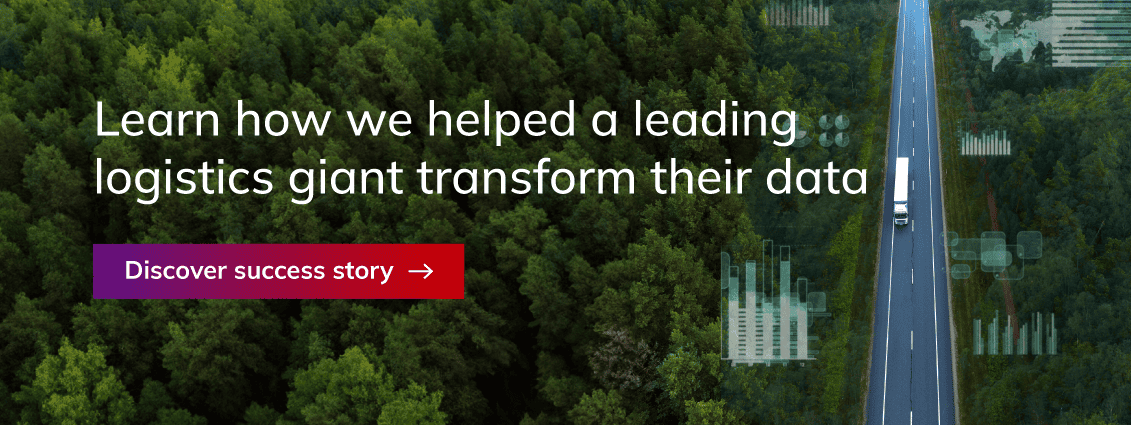- Solutions
Our solutions
Digital solutions combining strategy, technology, automation and people.
Technology advisory
Navigate the fast-changing world
Cloud engineering
Transformational change at scale and speed
Data solutions
Realise the untapped potential of data
AI and machine learning
Leverage your data assets
Application engineering
Optimise and grow your digital investment
Maintenance and support
End-to-end application management
Business process solutions
Manage business processes to reduce operating costs
Quality solutions
Independent testing for your systems and software
Digital experience platforms
Redesign your digital assets for the optimal customer experience
- Industries
Industries
We provide solutions tailored to your sector to assist you in identifying opportunities, realising value and opening up new markets.
Banking
Delivering next-gen banking solutions that drive growth
Healthcare
Patient empowerment, lifesciences, and pharma
Retail
Functional and emotional customer experiences online and in-store
Travel
Airlines, online travel giants, niche disruptors
Media and publishing
Content consumption for the tech-driven audience
Hi-tech and IOT
Real-time information and operational agility and flexibility to respond to market changes
Logistics and supply chain
Reimagine a supply chain that is more flexible and resilient to change
Education
Create an exciting and engaging digital experience for students and departments
Insurance
Streamline operations, expedite claims, and unlock new possibilities
- Our thinking
Our thinking
The latest updates to help future-focused organisations on the issues that matter most in business.
News
Keep up to date with company news and announcements at NashTech
Insights
The latest expertise and thought leadership from the NashTech and our clients
Resources
Expert guidance on everything from complex technological issues to current trends
Digital Leadership Report
Explore insights from the latest world's largest and longest-running study on technology leadership
- Case studies
- About us
About us
Find out what makes us who we are
Leadership
The diverse leadership team at NashTech
Nash Squared
A global professional services organisation with three key areas of focus
Vietnam 360°
Experience a 360 degree all-encompassing virtual tour of NashTech’s Vietnam offices
ESG
Discover our environmental, social and governance commitments
Diversity, equality and inclusion
Making diversity, equality and inclusion an integral part of our culture
Our locations
Discover our network of global offices, centres of excellence and innovation
- English
The role of data analytics in driving business sustainability

Short on time? Don’t miss out. Here are the key highlights:
- ESG has taken over corporate agendas as organisations face pressures to fulfil consumer, investor and regulatory expectations
- Advanced technologies, AI, IoT, cloud and blockchain are speeding up the journey to responsible business trading
- ESG strategy starts with data. Yet, organisations are struggling due to a lack of ESG standardisation, fragmentation and analytics platforms.
- Change happens gradually, but we no longer have the luxury of time
- The time to start was yesterday. How will you support the ESG agenda?
The ESG catalyst – three simple letters, yet central to every business leader’s value proposition
We’ve all heard the three-letter acronym. Whether it’s been thrown around the boardroom, addressed by global investment giants or the subject of governmental policies, the term ESG – environmental, social, governance – has risen in popularity over the last twenty years since its conceptualisation.
What was once considered the most significant predictor of an organisation’s future success – ‘being financially profitable’ – is no longer the reigning factor among today’s changing societal expectations. In fact, sustainable business leaders are now urging organisations to consider ESG reporting with the same seriousness as they would traditional financial reporting.
But what’s behind this shift? Well, societal agendas are changing the face of business and government policy alike. The urgency of environmental and societal factors such as the climate emergency, inclusivity and social fairness are impacting consumer buying behaviours. Indeed, consumers today care less about the economic standing of organisations they affiliate with and rather their social, environmental and political stances. Reports by McKinsey and PwC found that more than 60 percent of consumers would pay more for a product with sustainable packaging and 76 percent would cease buying from organisations that maltreat the environment, employees and their local communities.
So where are we to date? The ESG agenda has taken flight across organisations worldwide. According to reports, 90% of organisations already have or are in the process of putting in place formal strategies to address ESG practices and frameworks. But in the race to meet the new social standards, organisations are realising one thing – they lack the infrastructure and data required to bring about such change. Thus, organisations are yet to deliver the outcomes we so desperately need today.
This is where technology offers its helping hand, lending better data reporting, tracking, optimisation, analysis and more. So, where do technology and ESG meet?
Where technology meets ESG
Heard of the ‘technology eco-advantage mindset’? Advanced technologies are opening up new opportunities in the world of ESG. Organisations are using data analytics, AI, cloud, IoT and blockchain to help achieve sustainability goals, while also reducing their overhead costs and driving efficiency – ‘two birds with one stone’. But embedding technology into ESG strategy demands more than just a simple software adjustment, it requires strong data that can support corporate sustainability programmes and build the needed transparency across business supply chains.
ESG compliance starts with data, or more so, data synthesis
Organisations need ESG data – and tonnes of it – to meet growing investor, consumer and policy demands
Indeed, data is the backbone of sustainable business practice. It enables organisations to implement and review ESG strategies, track metrics across the value supply chain and manage future risks. But this is where the complications arise. Often, ESG data is lacking, fragmented and inconsistent, and when combined with mediocre analytic platforms, organisations struggle to achieve their sustainability targets, or even know where to start.
The lack of standardisation hinders progress
The movement towards sustainable business reporting is a relatively new practice that runs on a voluntary basis – an unfortunate gateway to ‘green-washing’. Thus, there is yet to be a ‘single source of truth’ when it comes to global ESG standardisation and there are vast disparities between cross-border frameworks. Compare for example the EU taxonomy and the Global Reporting Initiative. Not only does this cause confusion among organisations around which types of data points are needed, but the lack of common global standardisation makes it difficult for investors to compare one organisation’s performance against another. To put it simply, there is no ‘model’ for what excellent ESG reporting should entail.
Data fragmentation – if ESG data were audited, we would all fail.
So, your organisation is starting its ESG journey – where do you begin? There are endless metrics related to ESG, such as carbon emissions, energy consumption, resource usage, waste management, workforce composition…The list goes on. The challenge that organisations face today is weeding through the enormous amount of data and defining the data points they should be collecting – if such data exists at all. Because of the lack of legitimate ESG reporting in the past, data is often siloed or non-existent, making it harder for organisations to spot trends and track the efficacy of their programmes over time.
‘You can’t manage what you can’t measure’
Let’s go back to the point about the infancy of corporate sustainability. Since it’s a newer practice, organisations seldom have the advanced analytics platforms in place to track ESG data across the entire spectrum of their organisation. A recent survey revealed that as little as 9% of organisations actively use software that supports data collection, reporting and analysis on ESG. Yet, organisations need to have the tools in place to automatically measure their performance in real-time, after all, ‘you can’t manage what you can’t measure’.
Cloud technology offers respite for the ESG agenda
The conundrum is that the ESG regulatory landscape is rapidly changing, together with the enormous amounts of data that is being generated. To stay on top of their ESG ratings, organisations need data management centres that can keep up with the enormous influx of data and scale up or down in line with growing supply chains and regulatory policies.
Cloud computing has emerged as a key enabler of ESG strategy, given that it delivers scalability, flexibility and accessibility to those who need the data, for example, investors. A survey conducted by PwC revealed that 60% of business leaders report using cloud to enhance ESG reporting or plan to adopt it as part of their sustainability strategy. But efficiency isn’t its only advantage. Making the switch to cloud technology produces less emissions than physical on-premises data centres – as such, it’s a ‘win, win’ scenario. According to the World Economic Forum, moving from outdated on-premises centres to the cloud is expected to prevent at least 629 million metric tons of CO2 from entering the atmosphere between the years 2021 and 2024.
Explore NashTech cloud solutions here.
Change is gradual, but we can no longer afford the luxury of time
While it’s true that organisations are starting to recognise their role in ensuring sustainable business practice, the progress is too slow. The wake of the climate emergency means that we no longer have the luxury of waiting for change; in 2022 alone, we saw 10-climate related disasters, racking up over $3 billion-worth of damage each.
But where does the responsibility lie?
The answer is in each and every one of us.
Organisations need to take an active approach to managing their supply chain rather than remaining passive or doing the bare minimum for reputational sake, with the board being active advocates for this. Likewise, we as consumers need to put more thought into how we approach buying.
Organisations can start by:
- Engraining purpose driven missions from top management down
- Educating employees, leaders and consumers on their role in ESG
- Rethinking digital strategies to be sustainability led
- Acting as ambassadors in the ESG fight
- Being proactive and ensuring transparency across the entire supply chain
- Working together with other organisations by data sharing
“We can plant all the trees in the world, but if we fail to focus on the real problems, we will never see the change we so desperately need to see.” – IFA, 2023.
Navigating ESG with NashTech
Are you prepared to handle the rising ESG pressures?
The case is clear; the commercial viability of your organisation depends on the ESG steps you take today. At NashTech, we can help you monitor your organisation’s ESG impact across the entire supply chain. From technology products to operational activities, we can help you adopt sustainable technologies and practices that meet compliance requirements now and in the future.
Discover NashTech’s data solutions here and pave your way to a sustainable future.
Find out more about how we are driving the ESG agenda at Nash Squared: https://www.nashsquared.com/post/esg-now-is-the-time-to-show-your-true-colours
Suggested articles

The art of human-AI collaboration: A case study in model improvement
For over 16 years, NashTech has been a trusted partner, providing data management solutions that have fuelled the exponential growth of our client’s online shopping platform. The approach has...

From rising above adversity to riding the wave of digital transformation in the education sector
Explore how NashTech help Trinity College London ride the wave of digital transformation in the education sector

Migrating and modernising the virtual learning environment to AWS for an enhanced experience
The migrated and modernised Moodle infrastructure means that The Open University can now take advantage of cloud benefits.
We help you understand your technology journey, navigate the complex world of data, digitise business process or provide a seamless user experience
- Topics:



